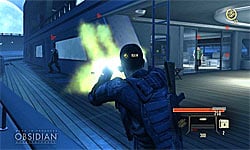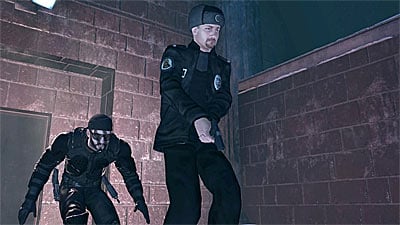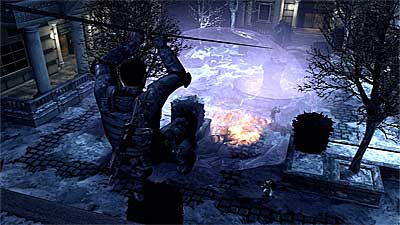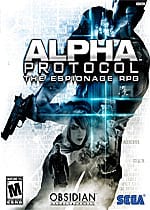Spy Game
For all the weapons, women, and worldliness we associate with spies in pop-culture, you’d think espionage would be a genre as worn out as open-world games or cover shooters. For whatever reason, though, this hasn’t been the case, and aside from the occasional-if-obligatory appearance from 007 or the stealth outings from Metal Gear Solid or Splinter Cell, secret agents and international intrigue just haven’t been topics video games have tackled very often-at least not without being shoehorned into more frequently-used design types. Alpha Protocol, then, could arguably be the first “real” espionage-related title to come out in years, in terms of the gadgets, globetrotting, and generic infrastructure that come to mind when thinking about spies.

Although Alpha Protocol has all the typical tropes (shadowy government agencies, double crosses, a diverse cast of character archetypes, underlying mysteries, and would-be rogue agents on the lam from their own government) shared both by spy lore as well as the likes of Snake and Sam Fisher, where it differs is in its adherence to these conventions. Plot twists and intrigue feature prominently in Splinter Cell and Metal Gear, but these series arguably each have their own agenda; compared to Alpha Protocol’s more typical spy fare, these series’ presentations have thus become more about their respective protagonists and overarching narrative than an overriding culture of archetypal espionage.
This isn’t to say that Alpha Protocol doesn’t have character development or significant narrative involvement – it just takes a more tried-and-true approach that feels more like what you might expect from a spy-related television show like 24 than the varied directorial approaches seen in Splinter Cell or Metal Gear. Somewhere along the way, reps for Alpha Protocol dubbed the game the “Espionage RPG,” a smart move in terms of keeping it from looking like just another action game (of sorts). But calling it an RPG in the vein of Mass Effect (at one point I even described the game to a friend as Mass Effect in a spy setting) is actually a bit of a misnomer. There’s some ME-style design thrown in for good measure, but Alpha Protocol mostly (and not unexpectedly) borrows heavily from stealth-action games. Does this design cocktail work? Well, mostly.
Alpha Protocol’s other big claim to fame is that you’re supposed to be able to go into a situation either using stealth or pumping lead into anything and everything you see, similar to Uncharted 2’s brilliantly executed stealth segments. The idea holds up fairly well, since the transition from sneaking around knifing enemies or knocking them out to going all out on someone is generally a smooth one. But sadly, the stealth-to-action switch isn’t handled as well as it is in Nate Drake’s second outing (or even MGS4, whose confrontations almost always seemed to inevitably turn to straight-up action).

Enemies sound alarms, making progress difficult while keeping any nearby foes at full alert. Gunplay is not conducive to action-movie blazing, with stat-based factors like recoil and firing intervals pushing you towards picking your shots carefully. CQC is handled with one button, and while operative Mike Thornton’s hand-to-hand brutality is plenty satisfying (and upgradeable) there’s no way to block any retaliatory strikes from your enemies. So most of the time you’ll probably end up playing things stealthily until you screw up.
The stealth approach works better within the framework of Alpha Protocol’s mission structure, anyway. Generally, spy-oriented games will have you using the occasional gadget or possibly having to, say, override security protocols within the confines of a specific mission. In Alpha Protocol, however, this is the norm. I have to give Obsidian credit for really thinking about the intelligence gathering aspect of the game and not simply streamlining it. Alpha Protocol’s mission-based structure is linear (mostly), but in order to actually accomplish what you’re trying to do (in this case, stop a series of terrorist cell activities in various parts of the world) you have to gather a lot of intel before you can even realistically have enough information to know what to do, where to go, and what the situation is.

Information doesn’t come easily (or cheaply), meaning you have to do almost all of it yourself by any means necessary; you will find yourself routinely talking to contacts, gathering intelligence on the area activities, bluffing your way through dealings with shady characters, breaking-and-entering to bug computer networks, and hack files, email accounts, and security systems. This is where Alpha Protocol takes its cues from ME (aside from the leveling up system, which is almost exactly the same), since most of the above activities are done in real-time through simple mini-games, and conversations are handled through a similar tree system used in BioWare’s sci-fi series.
However, the interesting way that Alpha Protocol handles conversation and information gathering is one of the coolest elements of the game, and one that will warrant multiple playthroughs. Unlike ME, any talking you do here is timed, and Mike can usually reply with something suave, impatient, or professional (though other options become available from time to time and in context). At the same time, the game keeps a running tally on every contact you have, as well as their opinion of you. What makes this seemingly innocuous relationship system unique, however, is that unlike in ME, where you NPCs usually just react to you acting like either a saint or a total bastard, the characters in Alpha Protocol have personality likes and dislikes, and will either favor you or not depending on your approach.

This is particularly evident with women, since some will respond to flirtation, while others think this approach makes Mike come off as crass or an idiot. Given that you only have a few seconds to choose your response to any given NPC, timing and approach can be crucial to successfully currying favor with certain parties, which can in turn have some lasting effects on how the game unfolds. Although it would probably rarely happen to a real field agent, chances are high you’ll read a situation wrong and have to deal with the consequences. The system may be subtle, but the game is much more interesting for it.
Alpha Protocol isn’t perfect. The enemy AI can be cringe-worthy and prone to bugs, and some of the spy abilities Mike can earn after leveling up enough are a bit silly (Shadow Operative, for example, renders you completely invisible, making some full-frontal attacks on enemies, that would otherwise be nearly impossible to get through undetected, an unrealistic breeze). Missions are stage-based, with no free-roaming, civilian NPC-populated areas to explore like in ME.
Character customization is bafflingly basic and bosses can be annoyingly cheap. On the other hand, the game is gorgeous, with top-notch production values and voice work. It’s fun to develop relationships between Mike and the game’s various other characters. The stealth gameplay is pretty good, if a little too easy sometimes. The game makes you feel like a real spy, complete with all the research-based legwork. In those respects, there are few games like it. Whether or not you like Alpha Protocol is probably going to depend on your proclivity for spy lore itself. But if you’ve ever wanted to be a secret agent, you could do a hell of a lot worse.
RATING OUT OF 5 RATING DESCRIPTION 4.6 Graphics
Alpha Protocol is a very pretty game marred only by texture pop. 4.2 Control
Whether sneaking around or guns blazing, most everything comes off without a hitch. 4.5 Music / Sound FX / Voice Acting
Fantastic voice work, particularly Mike’s deadpan. Throat stabbings and brutal melee is very aurally satisfying, with an appropriately themed soundtrack. 4.2 Play Value
It’s not an overly original culling of design elements, but Alpha Protocol is spy-authentic and pretty damn fun. 4.3 Overall Rating – Great
Not an average. See Rating legend above for a final score breakdown.
Game Features:
